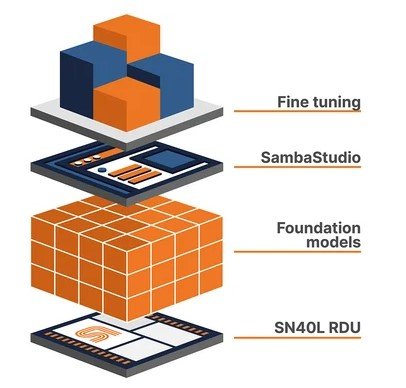DataScale
Sam Ba Nova: Advanced AI by SambaNova Systems
Quickly deploy generative AI models at scale with the SambaNova DataScale® SN40L, the only hardware system that scales for agentic AI to meet the needs of any size organization.
The Sam Ba Nova DataScale system delivers exceptional performance in an energy-efficient, small footprint. Why Choose Us?
✔ Strategic Cloud Migration Planning – Minimize downtime and optimize costs
✔ Secure & Scalable Cloud Solutions – Tailored to your business needs
✔ Seamless Data & Application Transfer – No disruptions to your operations
✔ Expert Data Center Architects – Decades of experience in cloud and on-prem environments
🚀 Future-Proof Your IT Infrastructure Today! Contact us for a free consultation on your cloud migration strategy.
The Superior Alternative to GPUs
SN40L Reconfigurable Dataflow Unit
The innovative SN40L RDU is purpose-built for AI, with a dataflow architecture and a three tiered memory design to power the largest and best AI models that drive agentic AI.
The result is the fastest platform in the world.
The Platform for Inference & Fine-tuning
SambaNova Suite
Get world record performance on the most efficient, accurate, and secure AI platform
SambaNova delivers the only complete AI solution with:
Fine-tuning
SambaStudio
Foundation models
SN40L RDU
Migrations & Cloud Solutions
Scalable solutions for a smooth transformation. Every strategy and assessment to planning and delivery, we’re with you every step of the way.
Application & Workload Migration
Increase agility and reduce cost with on-premises, cloud, and hybrid solutions and minimal disruption to your business.
Lift & Shift Relocation
We specialize in managing migration projects of any scale, guaranteeing a smooth migration that's on time, every time. Physical or logical forklifts of networks or services.
Current State Assessment
The most important stage of any migration strategy—because understanding where you are gets you where you need to be.
-
Evaluate the current infrastructure, applications, and dependencies.
Identify critical systems and data to prioritize in the move.
-
Set clear goals for the migration, including performance, cost, and security targets.
-
Choose between on-premise, colocation, or cloud solutions.
Assess the new environment's scalability, security, and compliance.
-
Develop a roadmap with timelines, resources, and milestones.
Plan for downtime, backups, and data synchronization during the move.
-
Identify potential risks (e.g., hardware failure, data loss) and create mitigation strategies
-
Assign roles and responsibilities to the migration team.
Ensure all necessary hardware, software, and tools are available
-
Conduct dry runs or pilot migrations to test the process and resolve any issues
-
Begin the actual migration, following the planned schedule.
Monitor progress and address any challenges in real-time
-
Ensure that all systems are up and running as expected.
Test performance, security, and functionality of the new setup
-
Optimize the new environment for performance and cost-efficiency.
Handover operations to the management team for ongoing support


